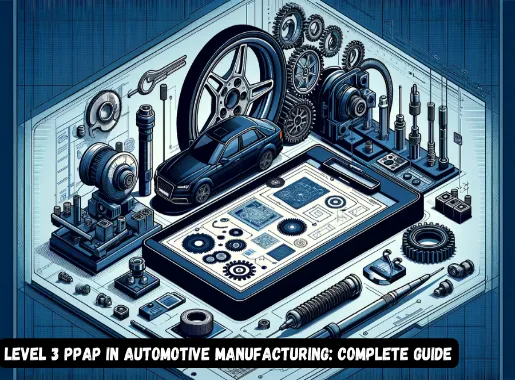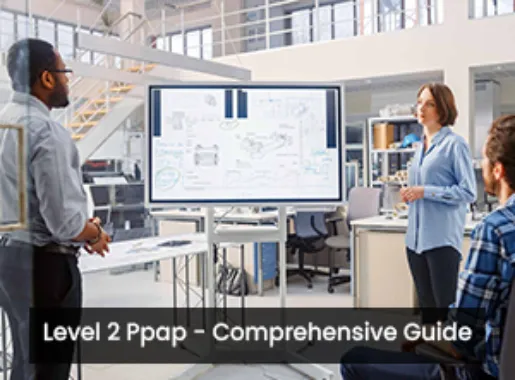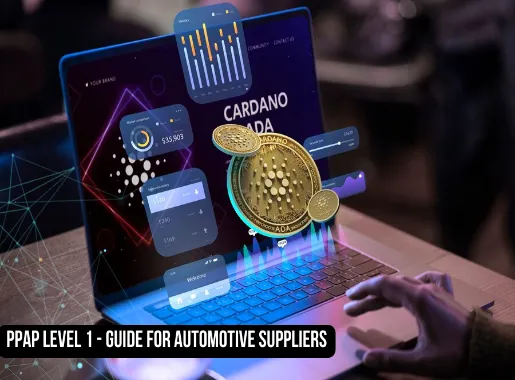Ppap Level 4 - Key to Quality
The Production Part Approval Process (PPAP) is pivotal in Mexico's automotive industry, ensuring parts meet rigorous standards. PPAP Level 4, a crucial tier in this process, demands meticulous documentation and validation, but with a specific focus. Unlike other levels, it requires less frequent submission of documents, retaining them primarily for internal review and occasional customer requests. This level's complexity lies in balancing detailed record-keeping with efficiency, crucial for large-scale manufacturers. Mastery of PPAP Level 4 is vital, as it streamlines production while upholding the quality and safety standards critical in the competitive automotive sector.
What is PPAP Level 4?
PPAP Level 4, as defined by the Automotive Industry Action Group (AIAG), is a specific tier within the Production Part Approval Process. This level is characterized by its requirement for fewer submission elements than the other levels. It’s designed for situations where there’s a need for reduced documentation due to the supplier's proven track record or the nature of the product.
Differentiating PPAP Levels
- Level 1: Involves the basic submission of data for review.
- Level 2: Includes a more detailed submission with product samples and limited supporting documentation.
- Level 3: The most comprehensive level, requiring full design records and extensive documentation.
- Level 4: Requires less frequent submission of documents, primarily kept for internal review and occasional customer requests.
- Level 5: Involves the complete PPAP submission along with part samples and continuous production run.
Comparison of Submission Requirements
| PPAP Level | Submission Requirements |
|---|---|
| Level 1 | Basic submission for review |
| Level 2 | Detailed submission with product samples |
| Level 3 | Full design records and extensive documentation |
| Level 4 | Reduced documentation, internal record-keeping |
| Level 5 | Complete PPAP with samples and production run |
PPAP Level 4 is particularly suitable for suppliers with a history of consistent quality and reliability. It allows for a more streamlined process while maintaining the core objective of PPAP: ensuring the quality and reliability of automotive components. This level of PPAP is beneficial in reducing administrative burdens without compromising on the quality assurance that is paramount in the automotive industry.
Have a deep understanding of the Production Part Approval Process (PPAP).
Key Elements of PPAP Level 4
Understanding the Core Components of Level 4 PPAP
- Part Submission Warrant (PSW): The PSW in PPAP Level 4 is a critical document. It serves as the official notification to the customer that the PPAP documentation has been submitted. The PSW summarizes the entire package and confirms that the supplier meets all the specified requirements. It's essentially a declaration that the parts are ready for review and approval.
- Product Samples: For Level 4 PPAP, the specific number and types of samples required can vary based on factors like production volume and the complexity of the parts. These samples are crucial as they provide a physical representation of what has been produced, allowing for a tangible quality check.
Supporting Documentation
Essential documents for Level 4 PPAP include:
- Design Records: These outline the specifications and dimensions of the part.
- Process Flow Diagrams: These charts detail each step in the manufacturing process, ensuring that all processes are properly planned and executed.
- FMEAs (Failure Mode and Effects Analysis): These are used to identify potential failure modes in the design and manufacturing process and their possible effects.
- Control Plans: These plans detail the methods that will be used to control the manufacturing process and ensure quality.
- Test Results: Demonstrating that the part meets all design and functional specifications.
In Level 4 PPAP, the documentation must be complete and accurate, aligning perfectly with customer specifications. The focus is on demonstrating a consistent and reliable production process that meets the quality standards expected in the automotive industry.
Implementing PPAP Level 4 effectively requires a thorough understanding of these key elements and a commitment to maintaining high standards of quality and precision. This level of attention to detail not only ensures compliance with customer requirements but also enhances the reliability and reputation of the supplier in the automotive supply chain.
You can also read about the New Product Introduction (NPI).
Additional Considerations for Level 4 in Mexico
In Mexico, the implementation of PPAP Level 4 may come with specific regional or regulatory nuances that suppliers need to be aware of:
- Regional Regulatory Requirements: Suppliers should be familiar with any local automotive industry standards or regulations that apply specifically in Mexico. This could include environmental regulations, labor laws, or specific quality standards that go beyond the typical PPAP requirements.
- Collaboration with Customers: Clear and continuous communication with customers is vital, especially when dealing with Level 4 PPAP in Mexico. This ensures that any region-specific requirements are clearly understood and met. Regular updates and discussions can help align expectations and facilitate a smoother approval process.
- Understanding Local Market Dynamics: Suppliers should also be aware of the unique aspects of the Mexican automotive market. This understanding can help in tailoring the PPAP submission to better meet the expectations of local customers.
- Language and Cultural Considerations: Effective communication might also mean overcoming language barriers. Ensuring that all documentation is accurately translated into Spanish, and understanding cultural nuances, can be crucial in ensuring a successful PPAP process in Mexico.
- Customer-Specific Requirements: Some automotive manufacturers in Mexico may have specific requirements that are unique to their operations. Suppliers should ensure they have a clear understanding of these customer-specific requirements before beginning the PPAP process.
- Quality Standards: Suppliers need to maintain high-quality standards as per Mexican automotive industry expectations. This involves ensuring that all parts and components meet the stringent requirements necessary for the local market.
By considering these additional factors, suppliers can effectively navigate the nuances of Level 4 PPAP in Mexico, ensuring compliance with both regional regulations and customer expectations. This proactive approach not only facilitates successful submissions but also strengthens the supplier-customer relationship in the dynamic Mexican automotive industry.
Benefits of Implementing PPAP Level 4
Implementing PPAP Level 4 effectively brings several key benefits to both suppliers and customers within the automotive sector in Mexico:
- Improved Quality Control: With Level 4 PPAP, there is a focused approach to quality control. This level requires suppliers to present detailed documents like design records and material certifications, ensuring that each part meets stringent quality standards. This thorough documentation process enhances the overall quality of the automotive parts produced.
- Reduced Production Errors: By requiring specific product samples and essential supporting documentation, Level 4 PPAP helps in identifying and correcting potential production errors early in the manufacturing process. This proactive approach minimizes the risk of costly errors and rework, leading to more efficient production cycles.
- Streamlined Communication: Level 4 PPAP fosters streamlined communication between suppliers and customers. The clear and defined requirements of this PPAP level mean that both parties are well-informed of the expectations and standards required, leading to fewer misunderstandings and a more cohesive working relationship.
- Cost-Effective Manufacturing: The focused approach of Level 4 PPAP can lead to cost savings for suppliers. By concentrating on key documentation and samples, suppliers can avoid the excessive administrative burden of higher PPAP levels while still meeting quality standards, leading to a more cost-effective manufacturing process.
- Enhanced Customer Confidence: Successfully implementing Level 4 PPAP builds customer confidence. When suppliers demonstrate their ability to meet PPAP requirements effectively, it reassures customers of the supplier's commitment to quality and reliability.
- Flexibility in Meeting Customer Needs: Level 4 PPAP provides a balance between rigorous quality assurance and flexibility in meeting customer needs. This balance is particularly beneficial for suppliers with a proven track record of quality and consistency, allowing them to adapt more easily to specific customer requirements.
In conclusion, the effective implementation of PPAP Level 4 in Mexico offers significant advantages, including enhanced quality control, reduced production errors, streamlined communication, cost-effective manufacturing, and increased customer confidence. These benefits collectively contribute to a more efficient, reliable, and competitive automotive industry.
Trust us for your success!
For automotive suppliers in Mexico mastering PPAP Level 4, the expertise of Production Management Solutions can be invaluable. We offer specialized guidance in maintaining detailed documentation and ensuring compliance with rigorous standards. This partnership can streamline your process, reduce production errors, and elevate overall quality, reinforcing your commitment to automotive excellence. Embrace Quality Management Solutions to navigate the complexities of PPAP Level 4 with confidence and efficiency.


